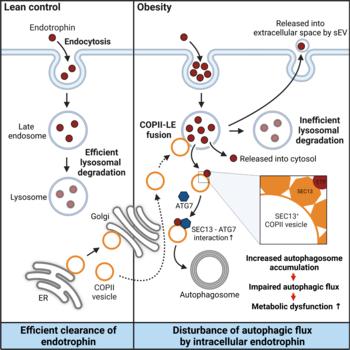▲ Graphical abstract / Extracellular endotropin enters the fat cell through endocytosis and goes to the lysosome to be degraded and recycled. However, in obese conditions, the degradation process to lysosomes is avoided, and endotrophins accumulate in adipocytes. In obese conditions, endotrophins either exit the cell through exosomes or are released into the cytoplasm, which is associated with the unconventional migration of COPII vesicles to late endosomes. Endotropin released into the cytosol promotes autophagosome formation by directly increasing the interaction between COPII’s SEC13 protein and autophagosome’s ATG7 protein, and excessive accumulation worsens autophagic flux. In other words, excessive accumulation of endotropin in fat cells in obese conditions promotes obesity-related metabolic diseases such as fat cell death, inflammation, and increased insulin resistance. (Picture and description = UNIST) © Patent News
Recent obesity-related research reports predict that more than half of the world’s population will be classified as obese or overweight in the next 10 years. Although obesity-related metabolic diseases are prevalent worldwide, the exact cause and treatment have not been found. However, recent studies on the relationship between obesity and diabetes have attracted attention.
The team led by Professor Jiyoung Park of the Department of Life Sciences at UNIST analyzed endotrophin protein derived from the extracellular matrix, which provides an environment necessary for cell growth and differentiation. The research team revealed for the first time in the world that endotropin protein, which is increased in obesity, enters fat cells and controls autophagy, which destroys unnecessary cells, causing inflammation and diabetes. This study is expected to be used for treatment of cancer and metabolic diseases related to obesity caused by inflammation and autophagy abnormalities.
Endotropin is an extracellular matrix protein that responds to metabolic stress outside the cell in case of obesity, and was first discovered in 2012 by Professor Jiyoung Park. Endotropin levels increase in obese situations, which is known to exacerbate diabetes by increasing adipose tissue fibrosis, inflammation, and insulin resistance.
The research team compared and analyzed the obese and non-obese situations to analyze in detail the pathways in which endotropin moves in and out of cells. In an obese situation, endotropin accumulates in adipocytes through the process of endocytosis, a pathway by which extracellular substances are transported into cells. This newly revealed that it not only promotes the formation of autophagosomes involved in autophagy, but also induces abnormalities in autophagy, such as inhibiting the disassembly of autophagy, which causes cell death, inflammation, and insulin resistance.
Specifically, it was found that endotropin introduced into adipocytes promotes the formation of autophagic cells through the mediation of SEC13, a protein related to protein transport, and the ATG7 protein, which is important in the formation of autophagic cells. In addition, autophagy accumulated in endotropin disrupts the balance of the autophagy process, leading to death of fat cells, increased inflammation, and worsening of insulin resistance. At this time, it was also confirmed that obesity-related metabolic diseases are improved by suppressing ATG7 protein function or neutralizing endotropin using the siRNA system, a system that interferes with specific gene expression.
Professor Park Ji-young of the Department of Life Sciences said, “The accumulation of endotropin in cells can be used as a biomarker to indicate an imbalance in extracellular matrix homeostasis.” It could be a promising therapeutic strategy for treating obesity-related metabolic diseases.”
The results of this study were pre-published online on Saturday, June 10 in Metabolism: Clinical and Experimental, a top international journal in the field of endocrine metabolism, and are about to be officially published.
논문명은 High levels of intracellular endotrophin in adipocytes mediate COPII vesicle supplies to autophagosome to impair autophagic flux and contribute to systemic insulin resistance in obesity 이다.
2023-07-11 16:20:00
#Metabolic #diseases #improved #regulating #autophagy #adipocytes #Patent #News


